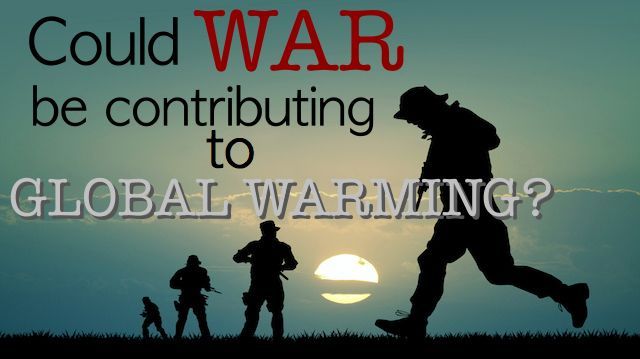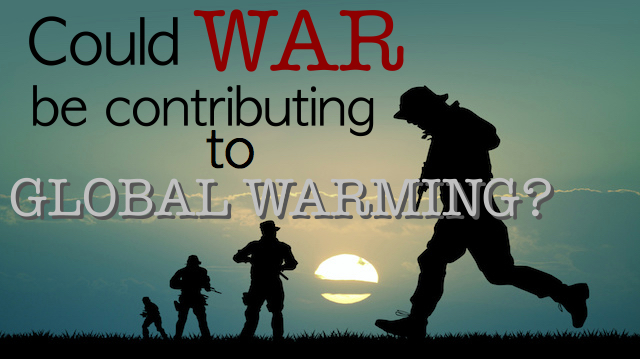
The acclaimed novelist and activist Alice Walker says this about war and global warming:
“War contributes greatly to global warming, which shouldn’t surprise us. All those bombs going off, all those rockets, all those planes and helicopters. All that fuel of various kinds being used. It pollutes the air and water of this very fragile and interconnected planet.”
Although Alice is not a scientist, there may be solid grounds for her argument.
United Nations Secretary-General Ban Ki-moon agrees with Ms. Walker. He blames modern warfare for land contamination, water contamination, deforestation and natural resource depletion. There is clear, documented proof that wars cause huge resource depletion and can affect landscapes and habitats for 50 years or more. In Hiroshima, for example, where the atom bomb was dropped in 1945, people still suffer from cancer as a direct result of the radiation from the bomb. The bomb caused deforestation, and radiation continues to affect agriculture and contaminate water supplies.
According to the Institute for Economics and Peace, only 11 countries out of more than 190 countries in the world are currently in peacetime. All other countries are at war with another nation or involved in civil war. Wars require equipment, machinery, fuel, vehicles… the list goes on. This means that the drain on the world’s resources will continue to increase and impact the environment. This is in part due to greenhouse gases, which are created from the burning of fossil fuels to make energy.
In war-torn countries, the focus is on fighting and gaining money to support war efforts. Little thought or resources are given to protecting the environment, which causes issues like water depletion, droughts, earthquakes triggered by fracking, deforestation, and the depletion of wildlife. Bombing also destroys sanitation systems, causing wastewater to leech into the ground, which spreads disease and kills wildlife. The effects of this can been seen in Iraq. Research indicates that war in Iraq has led to significant environmental damage, and the bombing has increased the risk of cancer for the Iraqi population.
A 2011 study published by the National Oceanic and Atmospheric Administration (NOAA) uncovered a direct link between human interaction and the climate near the Mediterranean Sea. War and other changes have altered the climate and caused the area to have 10 of the 12 driest winters on record just within the last 20 years. The NOAA report showed that greenhouse gases were responsible for about half of the increase in dry winter weather in the area.
 Even more worrisome, a 2015 study published in the Proceedings of the National Academy of Sciences of the United States of America indicated that increasing climate change hastened the decisions that led to the Syrian war. So not only can war cause climate change, but climate change is directly increasing the number of wars, leading to a vicious cycle that can be difficult to stop.
Even more worrisome, a 2015 study published in the Proceedings of the National Academy of Sciences of the United States of America indicated that increasing climate change hastened the decisions that led to the Syrian war. So not only can war cause climate change, but climate change is directly increasing the number of wars, leading to a vicious cycle that can be difficult to stop.
The United States is far from blameless in the damage to the environment and resulting climate change. The U.S. uses an average of over 20 billion liters of fuel each year, with CO2 emissions equal to that of a mid-sized country. During the Iraq war, it was estimated that the U.S. used nearly 200 million liters of oil per month.
Can we stop war-related climate change?
During times of war, little thought is given to the environment. The damage is often so severe that some experts are calling war “ecocide.” These statistics show that change is necessary to prevent irreversible climate change that will lead to food shortages and ultimately additional wars. Only by taking action now and voicing our concerns can we prevent permanent damage to the Earth caused by warfare.
-Brenda Priddy
Brenda is a writer, chef and health nut with many years of writing experience in the alternative health industry. She specializes in health news, healthy living, alternative treatments, and healthy recipes. She loves educating others about sustainable, healthy living. Brenda lives in Texas with her husband and two daughters.
Sources:
http://www.theguardian.com/environment/2014/nov/06/whats-the-environmental-impact-of-modern-war
http://www.afedonline.org/afedreport/english/book12.pdf
http://www.icanw.org/the-facts/catastrophic-harm/hiroshima-and-nagasaki-bombings
http://www.visionofhumanity.org/#/page/indexes/global-peace-index
http://usatoday30.usatoday.com/news/washington/2008-04-02-2602932101_x.htm

